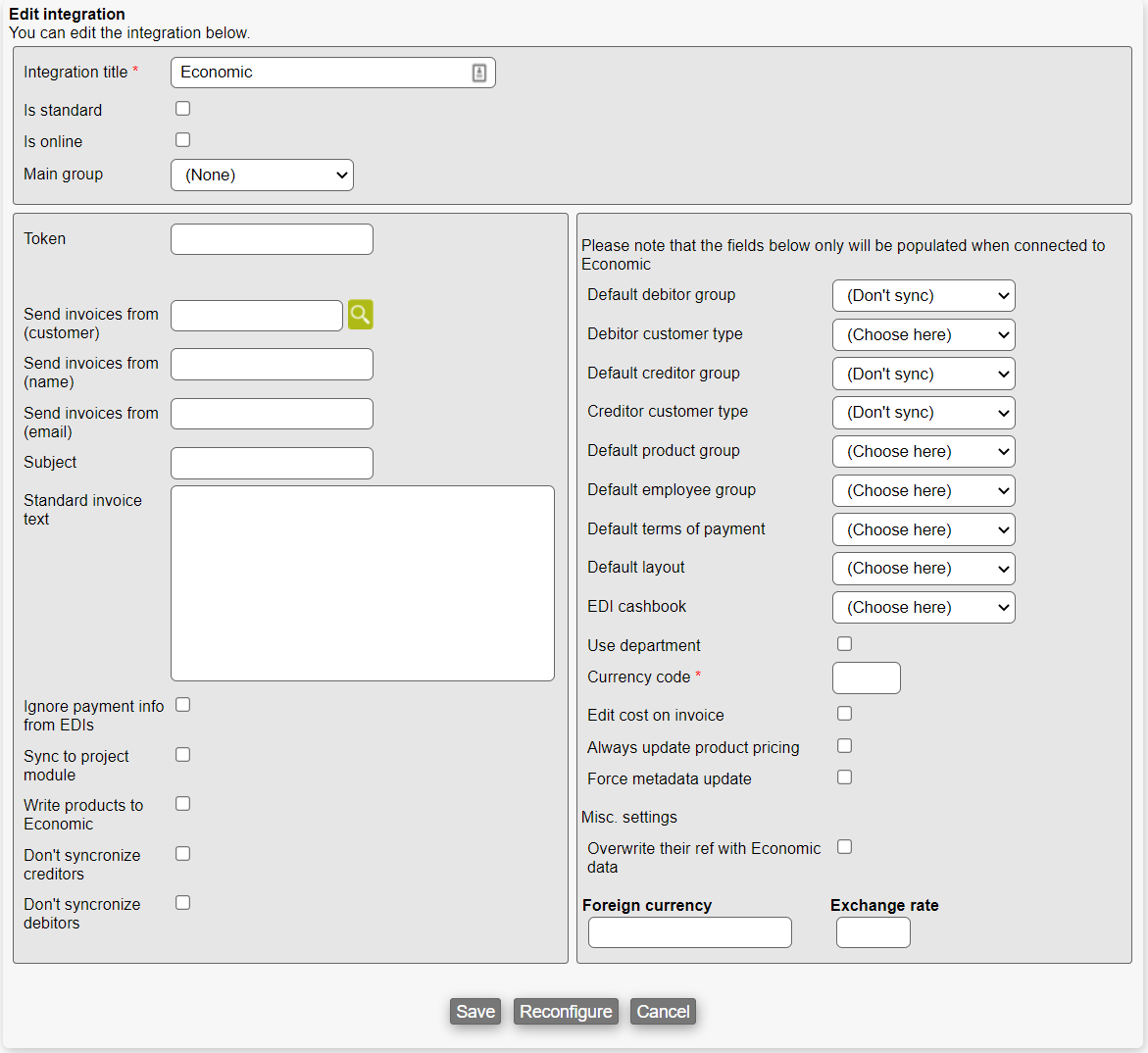Economic
Here you can find information about our native integration to E-conomic.

Integration title: The name of the integration
Is standard: Decide if this integration is the standard one over the others in the system
Is online: Decide if this integration is online in the system
Main group: If you have several main groups, you can select which main group this integration should be available for.
Token: The token used for communication with Economic. This is set automatic and should not be changed.
Send invoices from (customer): Select a CRM object from where invoices should be sent. Typically a CRM object representing your own company.
Send invoices from (name): The from name on emails containing invoices.
Send invoices from (email): The email invoice mails are sent from.
Subject: The subject of the standard invoice text
Standard invoice text: Here you can write a standard text for the invoice
Ignore payment info from EDIs: If this is checked and you are receiving EDI's in Microbizz, all payment info from these EDI's are ignored when transmitting the EDI to Microbizz. This should typically NOT be checked.
Sync to project module: Indicate if Microbizz should sync with the projekt module in Economic. Please note this function is in Early Release.
Don't synchronize creditors: If this is checked creditors aren't transmitted to/from Microbizz.
Don't synchronize debitors: If this is checked debitors aren't transmitted to/from Microbizz.
Default debitor group: The default debitor group when creating a new CRM object
Debitor customer type: The default customer type to assign, when receiving a new debitor from Economic.
Default creditor group: The default creditor group when creating a new CRM object.
Creditor customer type: The default customer type to assign, when receiving a new creditor from Economic.
Default product group: The default product group to place new products in. These can be changed later.
Default employee group: The default employment group to create new employees in, in Economic. This is both used for the project integration and for "our reference" on invoices.
Default terms of payment: Default terms of payment, when creating a new customer in Microbizz.
Default layout: Default invoice layout, when creating a new customer in Microbizz
EDI cashbook: If you are receiving EDI's in Microbizz, book them in this cashbook.
Accounting period: When booking EDI's we need to book them within the right financial year. Here you can select, which financial year we should target.
Use department: If checked, the integration will sync teams and departments.
Currency code: Type in your currency code e.g. DKK for Danish Krone or EUR for Euros
Edit cost on invoice: This makes the cost field editable on invoices.
Always update product pricing: When this is checked, we will always update product pricing. Otherwise we don't update this information. This is only regarding prices in the product catalogue and will not affect invoice lines.
Create products from invoice lines: If this is checked, we will create new products if we try to send an invoice line with a product number not known to Economic. Otherwise we will fail the export, if the product number isn't present in Economic.
Overwrite their ref with Economic data: Indicate if Economic will override "their reference" in Microbizz.
Foreign currency: Type in the currency code of any foreign currency you would like to use in the integration.
Exchange rate: Type in the exchange rate for the foreign currency. This should be the value of 100 units of the foreign currency in local currency. So if your local currency is DKK and your foreign currency is EUR, you would for example enter 744 to indicate that it takes 744 DKK to buy 100 EUR.
